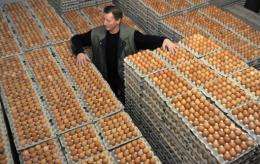Theodor Meyer stands between packages of eggs on his chicken farm in Emstek, northern Germany, on January 10. Meyer's farm with it's 55,000 hens was precautionary closed two days before Christmas in connection with the dioxine scandal. The farm began operating again on January 5, after suspicions on toxic contaminations were not confirmed.
Germany has closed 934 poultry farms and piggeries after a dioxin food scare, the agriculture ministry announced on Saturday.
The move came after authorities found that an animal feed manufacturer in the northern state of Lower Saxony had not provided a complete list of farms it sold its produce to, a statement said.
Sales were made not only to farms in the province but also in North Rhine-Westphalia, Bavaria and Brandenburg.
The scare began last week when it emerged that a German firm may have supplied some 3,000 tonnes of fatty acids only meant for industrial uses to makers of animal feed late last year. The feed was then widely distributed.
Around 100,000 eggs were destroyed while some 4,700 farms were banned from selling their products were closed pending tests. The vast majority of these farms have since been given the all-clear.
On Tuesday authorities said that pork with high levels of dioxin had been discovered at a farm in Lower Saxony, and that potentially tainted meat from the farm could be in shops.
South Korea and China have banned German pork imports, while Japan has ordered importers to report all pork shipments.
The German government said previously that none of the up to 150,000 tonnes of suspect animal feed had been exported, but the European Commission said this week that some had in fact made it to Denmark and France.
(c) 2011 AFP























